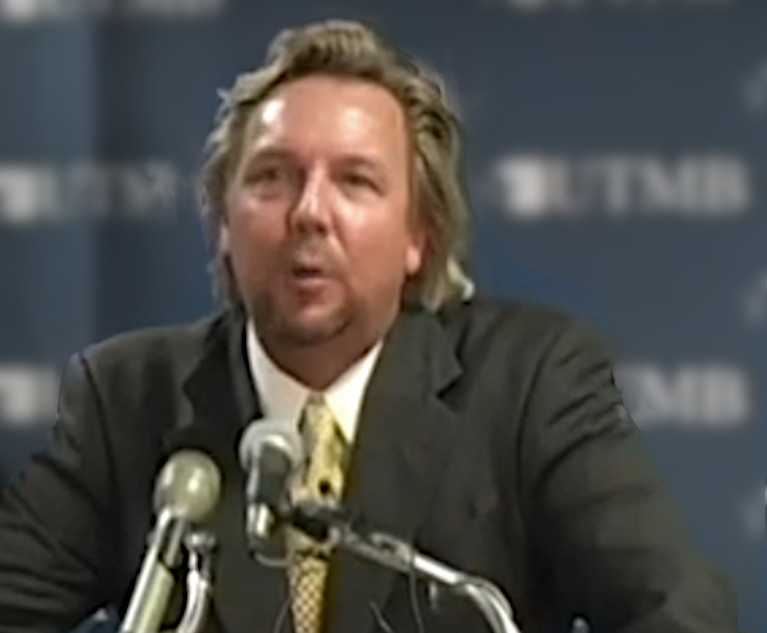Austin Appellate Boutique to Settle Fee Dispute With Chevron Phillips Chemical Co.
Alexander Dubose & Jefferson intervened and asked for a declaratory judgment to protect its interest in the funds, arguing that the firm had a contingent fee agreement that gave it ownership over some of the money.
July 01, 2019 at 02:40 PM
3 minute read
 Coins spigot
Coins spigot
There's a settlement coming in a long-running dispute over whether $494,000 from a sanctions award should pay attorney fees to Austin-based appellate boutique Alexander Dubose & Jefferson, or pay an underlying judgment instead.
On June 28, at the request of the law firm and defendant Chevron Phillips Chemical Co., the Texas Supreme Court overturned an earlier intermediate appellate court's opinion in the fee dispute and sent the matter back to the trial court with orders to render a judgment according to the settlement agreement. Court documents don't list details about the settlement.
“The terms of the settlement are confidential. This is a long, ongoing feud. It's just a matter of both sides getting together and saying, 'It's time to end this,'” said Alexander Dubose founding partner Doug Alexander, who represents his firm in the case. The firm this year changed its name from Alexander Dubose Jefferson & Townsend to Alexander Dubose & Jefferson, he said.
The background of the dispute is explained in the March 14 overturned opinion by the Ninth Court of Appeals, Alexander Dubose Jefferson & Townsend v. Chevron Phillips Chemical Co. The underlying lawsuit involved a failed real estate transaction in which Alexander Dubose represented plaintiff Kingwood Crossroads Inc.
Kingwood won attorney fee sanctions against one defendant, Exxon Land Development Inc., for discovery abuses. Alexander Dubose and another of Kingwood's law firms, Mayer Brown, had an alternate fee agreement with Kingwood that said those sanctions would be split between Kingwood, Mayer Brown and Alexander Dubose.
A 2011 appellate court ruling made the sanctions award final. In 2013, Exxon Land paid $989,000 in sanctions, and Mayer Brown deposited the money in its Interest on Lawyers Trust Account.
Meanwhile, one defendant in the underlying case, Chevron Phillips Chemical, had won $1.2 million in attorney fees for prevailing on a separate breach of contract claim. Chevron Phillips Chemical sought a turnover of Kingwood's sanctions funds to pay part of the judgment.
Next, Alexander Dubose intervened and asked for a declaratory judgment to protect its interest in the funds, arguing that the firm had a contingent fee agreement that gave it ownership over some of the money, and that the firm's contractual claim had priority over Chevron Phillips Chemical's claim.
The trial court ordered Kingwood to pay half the funds to Chevron Phillips Chemical, and to deposit the other half, $494,000, into the court's registry. In the end, the court denied Alexander Dubose's bid to get the money and ordered it released to Chevron Phillips Chemical.
The appellate court found the trial court abused its discretion by failing to use the right procedure to decide whether Alexander Dubose had a claim to the funds. The trial court should have conducted separate, initial proceedings to resolve the firm's claims. The opinion sent the case back to the trial court to try again.
Now, thanks to the Texas Supreme Court's June 28 ruling, the trial court has new orders to enforce the parties' settlement instead.
Chevron Phillips Chemical's lawyer, Scott Davis, founding shareholder in Hicks Davis Wynn in Houston, didn't immediately return a call or email seeking comment.
Mayer Brown partner Charles S. Kelley of Houston, who represented Kingwood in the underlying case, declined to comment.
This content has been archived. It is available through our partners, LexisNexis® and Bloomberg Law.
To view this content, please continue to their sites.
Not a Lexis Subscriber?
Subscribe Now
Not a Bloomberg Law Subscriber?
Subscribe Now
NOT FOR REPRINT
© 2025 ALM Global, LLC, All Rights Reserved. Request academic re-use from www.copyright.com. All other uses, submit a request to [email protected]. For more information visit Asset & Logo Licensing.
You Might Like
View All

Eversheds Sutherland Adds Hunton Andrews Energy Lawyer With Cross-Border Experience
3 minute read
Ex-Marathon General Counsel Takes Legal Reins of Another Energy Company
Trending Stories
- 1'A Death Sentence for TikTok'?: Litigators and Experts Weigh Impact of Potential Ban on Creators and Data Privacy
- 2Bribery Case Against Former Lt. Gov. Brian Benjamin Is Dropped
- 3‘Extremely Disturbing’: AI Firms Face Class Action by ‘Taskers’ Exposed to Traumatic Content
- 4State Appeals Court Revives BraunHagey Lawsuit Alleging $4.2M Unlawful Wire to China
- 5Invoking Trump, AG Bonta Reminds Lawyers of Duties to Noncitizens in Plea Dealing
Who Got The Work
J. Brugh Lower of Gibbons has entered an appearance for industrial equipment supplier Devco Corporation in a pending trademark infringement lawsuit. The suit, accusing the defendant of selling knock-off Graco products, was filed Dec. 18 in New Jersey District Court by Rivkin Radler on behalf of Graco Inc. and Graco Minnesota. The case, assigned to U.S. District Judge Zahid N. Quraishi, is 3:24-cv-11294, Graco Inc. et al v. Devco Corporation.
Who Got The Work
Rebecca Maller-Stein and Kent A. Yalowitz of Arnold & Porter Kaye Scholer have entered their appearances for Hanaco Venture Capital and its executives, Lior Prosor and David Frankel, in a pending securities lawsuit. The action, filed on Dec. 24 in New York Southern District Court by Zell, Aron & Co. on behalf of Goldeneye Advisors, accuses the defendants of negligently and fraudulently managing the plaintiff's $1 million investment. The case, assigned to U.S. District Judge Vernon S. Broderick, is 1:24-cv-09918, Goldeneye Advisors, LLC v. Hanaco Venture Capital, Ltd. et al.
Who Got The Work
Attorneys from A&O Shearman has stepped in as defense counsel for Toronto-Dominion Bank and other defendants in a pending securities class action. The suit, filed Dec. 11 in New York Southern District Court by Bleichmar Fonti & Auld, accuses the defendants of concealing the bank's 'pervasive' deficiencies in regards to its compliance with the Bank Secrecy Act and the quality of its anti-money laundering controls. The case, assigned to U.S. District Judge Arun Subramanian, is 1:24-cv-09445, Gonzalez v. The Toronto-Dominion Bank et al.
Who Got The Work
Crown Castle International, a Pennsylvania company providing shared communications infrastructure, has turned to Luke D. Wolf of Gordon Rees Scully Mansukhani to fend off a pending breach-of-contract lawsuit. The court action, filed Nov. 25 in Michigan Eastern District Court by Hooper Hathaway PC on behalf of The Town Residences LLC, accuses Crown Castle of failing to transfer approximately $30,000 in utility payments from T-Mobile in breach of a roof-top lease and assignment agreement. The case, assigned to U.S. District Judge Susan K. Declercq, is 2:24-cv-13131, The Town Residences LLC v. T-Mobile US, Inc. et al.
Who Got The Work
Wilfred P. Coronato and Daniel M. Schwartz of McCarter & English have stepped in as defense counsel to Electrolux Home Products Inc. in a pending product liability lawsuit. The court action, filed Nov. 26 in New York Eastern District Court by Poulos Lopiccolo PC and Nagel Rice LLP on behalf of David Stern, alleges that the defendant's refrigerators’ drawers and shelving repeatedly break and fall apart within months after purchase. The case, assigned to U.S. District Judge Joan M. Azrack, is 2:24-cv-08204, Stern v. Electrolux Home Products, Inc.
Featured Firms
Law Offices of Gary Martin Hays & Associates, P.C.
(470) 294-1674
Law Offices of Mark E. Salomone
(857) 444-6468
Smith & Hassler
(713) 739-1250







